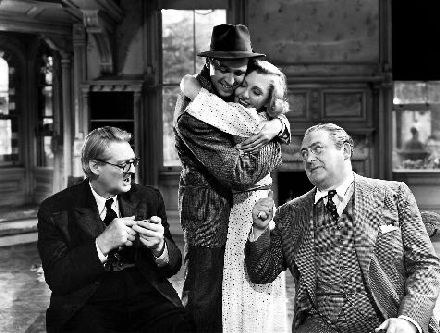You Can’t Take It with You (1938) 
“You’ll love them all for giving you the swellest time you’ve ever had!”

Director: Frank Capra
Cast: Jean Arthur, James Stewart, Lionel Barrymore
Synopsis: A man from a family of rich snobs becomes engaged to a woman from a good-natured but decidedly eccentric family.
The concept of the kind of Bohemian utopia established by rat-race refugee Martin Vanderhof (Lionel Barrymore — The Bells, Grand Hotel) in Frank Capra’s feel-good Oscar winner You Can’t Take It With You is a fine one in theory, but as with all idealistic theories, the principle is fatally flawed. We’d all like to forsake the 9-to-5 in order to do whatever it is we enjoy in life, but in reality each decision we make impacts on those around us so that all those individual pursuits would inevitably overlap and conflict. But this isn’t a problem for the purposes of the movie because the Vanderhof home is populated by eccentrics who are undisturbed by the antics of their fellow tenants. Vanderhof spontaneously opted out of the rat race while ascending (literally and metaphorically) in a lift. It’s a landmark moment in his life — later echoed by the banker Anthony P. Kirby (Edward Arnold — Mr. Smith goes to Washington) as he’s about to clinch a deal — but it’s one in which only those who have paid off their mortgage can truly afford to indulge. A visit from the IRS early on establishes not only Vanderhof’s rather unconventional views on taxes, but also the flaws in his liberal philosophy which render his views untenable (even though they’re alleged to have been closely aligned to the beliefs of Capra). This ideological naivety is undoubtedly You Can’t Take It With You’s weak spot, preventing it from being the classic it might otherwise have been. The Vanderhof’s utopia is a towering castle built on a foundation of sand, which means the movie’s message, while both commendable and desirable, is also sadly unsustainable.
Vanderhof’s granddaughter Alice (Jean Arthur — Mr Deeds Goes to Town) is the only member of the family holding down a steady job. She works as Kirby’s secretary and is romantically involved with his son, Tony (James Stewart — Destry Rides Again, It’s a Wonderful Life), the bank’s vice-president. Alice’s fears over how Kirby and his snooty wife (Mary Forbes — A Farewell to Arms, Roberta) will react to her unconventional family prove well-founded when Tony deliberately gets the date of their arranged dinner at the Vanderhofs wrong so that his parents can see how Alice’s parents truly live. This clash of strict conservatism and free-thinking liberalism initially sets up the expected conflicts, which are only compounded by the revelation that it’s Vanderhof’s refusal to sell his home that is stymying the biggest deal of Kirby’s career.
Despite its age, it’s surprising how relevant You Can’t Take It With You remains. Consider this speech from Alice when Tony mentions that everybody’s afraid to live: “..most people nowadays are run by fear. Fear of what they eat, fear of what they drink, fear of their jobs, their future, fear of their health… You know what his (Vanderhof’s) pet aversion is? The people who commercialise on fear, you know they scare you to death so they can sell you something you don’t need.” There isn’t a word in that dialogue that doesn’t apply as much to our lives today as it did back then, and it reveals the lie about how life was so much simpler in the old days.
Although he’s as engaging as he ever was, James Stewart wasn’t quite the finished article back in 1938, and was billed third after Arthur and Barrymore, which is about right. Although forgotten by most people today, Arthur was a major star at the time, and she gives a typically luminous performance, successfully transcending the unlikelihood of a free spirit working for a cold-hearted banker. However, it’s Edward Arnold, another overlooked mainstay from Hollywood’s golden era, who delivers the film’s most affecting performance as the wealthy banker.
You Can’t Take It With You provides great entertainment despite looking increasingly naïve the older it gets. For a couple of hours it provides us with a comforting (but false) image of how good life could be if our decisions were prompted by what made us happy rather than a pursuit of the kind of security that is never anything but transitory. It’s a pleasing dream, no doubt about it; but sadly that’s all it is…
(Reviewed 7th November 2014)
httpv://www.youtube.com/watch?v=0WY9RAroTS0
